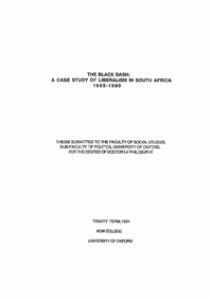Related Collections from the Archive
Related content
Thesis submitted to the Faculty of Social Studies, Sub-Faculty of Politics, University of Oxford, for the degree of Doctor of Philosophy. Abstract: The understanding of South African liberalism in the second half of the twentieth century, and particularly after 1960, has been impoverished by the scarcity of analyses of liberal political activity during this time. This study tries to redress this deficiency through an historical analysis of the Black Sach organisation, from its inception in 1955 until 1990. By means of a periodised narrative, this thesis examines the evolution to, changing social, economic and political conditions in South Africa. This study explores how the Black Sash prevailed in a political climate which was characterised by the almost complete decline of political liberalism. It shows how specific characteristics of the Black Sach's organisational identity, such as its White, middle-class, female membership, contributed to its resilience. It also shows how the particular focus of the Black Sach's activities, notably its concentration on extra-parliamentary politics and its nationwide network of legal advice offices, contributed to its political survival. The thesis also illustrates how attempts to articulate liberal values in South Africa involved the Black Sash in a process of political evolution, where experience and debate contributed to the development of its political identity. The Black Sach sustained an ongoing critique of its liberalism, reinterpreting and adapting traditional liberal concepts so that they more accurately reflected its evolving understanding of the liberal ideal in the South African context.
